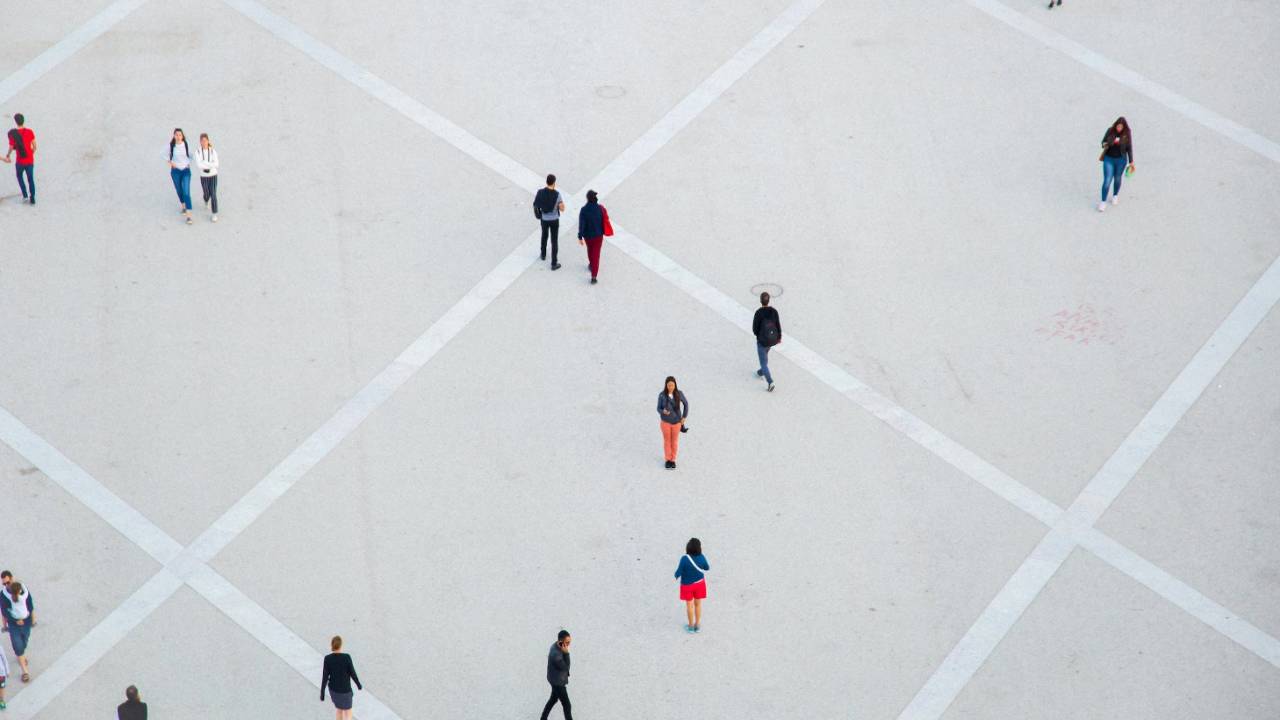Loneliness is a Public Health Crisis

Loneliness is a Public Health Crisis
On May 2, 2023, the U.S. Surgeon General, Dr. Vivek Murthy, issued an advisory that declared loneliness a public health crisis. That's right, loneliness is now considered a serious health problem that can have a negative impact on your physical and mental well-being.
Loneliness is the feeling of being alone or isolated from others. It's not the same as being alone, which can be a good thing and sometimes even preferred (we see you introverts and fellow neurodivergent humans). Loneliness is when you feel like you don't have meaningful connections with other people.

Within his advisory, Dr. Murthy called on individuals, communities, and organizations to take steps to address loneliness. He suggested that people reach out to friends and family, get involved in their communities, and volunteer. And, he also reached out to social media health creators to help spread this important message.
To do this, on May 1st (the day before America received the public announcement), Dr. Murthy's team held a private briefing with select mental health and medical creators and influencers to share the impacts loneliness can have on physical and mental health and to open up a forum for creators to ask questions directly to Dr. Murthy.
I was able to ask a question to Dr. Murthy about his advisory on loneliness and how he feels about issuing this important message to the American public. I'll share that with you below (it's a big deal), but first let's dive more into the advisory, loneliness, and the effects it has on us.
The U.S. Surgeon General's Advisory on Our Epidemic of Loneliness and Isolation
(We read the 82 page document so you don't have to 😉).

What is loneliness?
Loneliness is the feeling of being alone or isolated from others. As Dr. Murthy describes it, loneliness could be considered to be equivalent to social disconnection. It is a subjective experience, and what one person finds lonely, another person may not. Since 2014 when Dr. Murthy first became U.S. Surgeon General, he's heard stories from people describing loneliness in different ways. From "I have to shoulder all of life's burdens by myself" to "if I disappear tomorrow, no one will even notice", we've been feeling lonely for a long time.
Up to 50% of American adults report feelings of loneliness. Here are some common causes, signs, and symptoms of loneliness:
- Feeling sad, anxious, or depressed
- Feeling isolated or cut off from others
- Feeling like you don't belong
- Feeling like you're not good enough
- Having difficulty trusting others
- Having difficulty forming relationships
Between 2003 and 2020 (before the pandemic), national trends showed that we were not only spending more time alone, but we were also decreasing how much time we were spending with others in-person. And after 2020, it's clear the pandemic did not help the situation. Increasing social connection is vital for the well-being of our future and the time to make a change is now.
What is social connection?
Social connection is not just about the number of relationships you have in your life. It's about how much you actually feel connected to those people. There are three vital components to social connection and we highly recommend you get out a pen and paper and explore each of them on your own.
- Structure: The number of relationships you have, the type of relationships these are, and how frequently you interact with them.
- Function: How much you can actually rely on these relationships to support your needs; and
- Quality: The level of satisfaction, helpfulness, and/or positivity you find in these relationships
There's a reason you might have heard people say: "I prefer a few close, best friends rather than a bunch of loose acquaintances". The quality of the relationships matter.
What leads to loneliness and social disconnection?
It may seem like you're the reason you're lonely. Perhaps you've been told if you just changed or "got out more", you'd have more friends. There are likely things you could do to support yourself AND there are many factors that can contribute to loneliness not just personal choices. Some of these include:
Individual Factors of Loneliness
- Age: Older adults are more likely to experience loneliness than younger adults.
- Social isolation: People who are socially isolated are more likely to experience loneliness. Social isolation can be caused by a number of factors, including living alone, having few friends or family, or moving to a new place.
- Mental health problems: People with mental health problems, such as depression, anxiety, and schizophrenia, are more likely to experience loneliness.
- Physical health problems: People with physical health problems, such as chronic pain, cancer, and dementia, are more likely to experience loneliness.
- Life events: Life events, such as divorce, the death of a loved one, or job loss, can increase the risk of loneliness.
Relationship Factors of Loneliness
- Structure, function, and quality (see above)
- Emotional capacities: Level of empathy and the characteristics of others around you can limit one's ability to form deep relationships.
- Household size: Living alone and/or living with individuals who you don't have good relationships with can reduce opportunities for connection.
Community and Social Factors of Loneliness
- Housing and support program difficulties
- General social program availability
- Healthcare accessibility
- Public transportation availability
- Discrimination, bias, and violence in and against communities
The effects of loneliness and social disconnection are not good...

Let's get serious: Loneliness can have a significant impact on our health and well-being.
It can lead to:
- Increased risk of heart disease, diabetes, stroke, and dementia
- Increased risk of depression and anxiety
- Decreased life expectancy
- Reduced physical and mental health
- Increased risk of suicide
- Decreased productivity at work
- Increased social isolation
What can we do to address loneliness and social disconnection?
There are a number of things we can do to address loneliness, including:
- Reach out to friends and family: Make an effort to stay in touch with people you care about, even if it's just a quick phone call or text message.
- Get involved in your community: Join a club, take a class, or volunteer for a cause you care about. This is a great way to meet new people and make friends.
- Spend time in nature: Studies have shown that spending time in nature can help reduce stress and improve mood.
- Take care of yourself: Make sure you're getting enough sleep, eating a healthy diet, and exercising regularly. These things can help improve your overall health and well-being, which can make you less likely to feel lonely.
If you're struggling with loneliness, don't be afraid to seek help. There are many resources available to help you connect with others and build meaningful relationships.

What can organizations do to address loneliness?
Organizations can also play a role in addressing loneliness. Some things organizations can do include:
- Create opportunities for social connection: This could include hosting events, providing opportunities for employees to volunteer, or creating a mentorship program.
- Promote positive mental health: This could include providing resources on mental health, offering employee assistance programs, or creating a culture of support and understanding.
- Advocate for policies that support social connection: This could include supporting policies that make it easier for people to connect with others, such as policies that support affordable housing or flexible work arrangements.
By taking steps to address loneliness, we can improve the health and well-being of individuals and communities. As a business owner and a creator who works with several organizations on cause campaigns geared towards mental health, there is a huge feat ahead of us and coincidently if we work together we can not only reduce loneliness in ourselves, but in those that create the community we're trying to serve and support.
My Question to Dr. Vivek Murthy (You know I got personal 😎)
When I got the opportunity to ask the 19th/21st U.S. Surgeon General a question, I jumped at the chance to give Dr. Murthy an opportunity to reflect on his own journey as Surgeon General. After thanking him for his service to this country, I asked:
"What does it feel like to be the U.S. Surgeon General and releasing such a mental health related advisory versus a physical health advisory? This is something many past Surgeon General's may have shied away from, and it's so important."
I couldn't have been more pleased with his response. After thanking me for the question, he began to share about his own life experience as an adolescent and how he experienced loneliness. The lack of feeling like he could share about his experience feeling lonely only led to the feeling increasing. He shared that as human beings we all have a need to connect with others and that he's heard countless stories from around the country of people experiencing loneliness at alarming rates. He knew we had a public crisis on our hands (and have for a while).
It's been a really wild journey becoming a public mental health advocate and creator. Being able to speak to such prominent and influential people around the world is a privilege I do not take lightly and I'm so happy we have a U.S. Surgeon general willing to speak to so many people about issues once considered shameful and taboo.
We don't deserve to feel alone. There's a 8 billion people on this planet and I know there's lots out there that you deserve to be loved and known by.
Thanks for reading and remember: You're a human first, your unconscious is showing, and I'm so glad that you exist.
Written by Dr. Courtney Tracy, LCSW, PsyD


